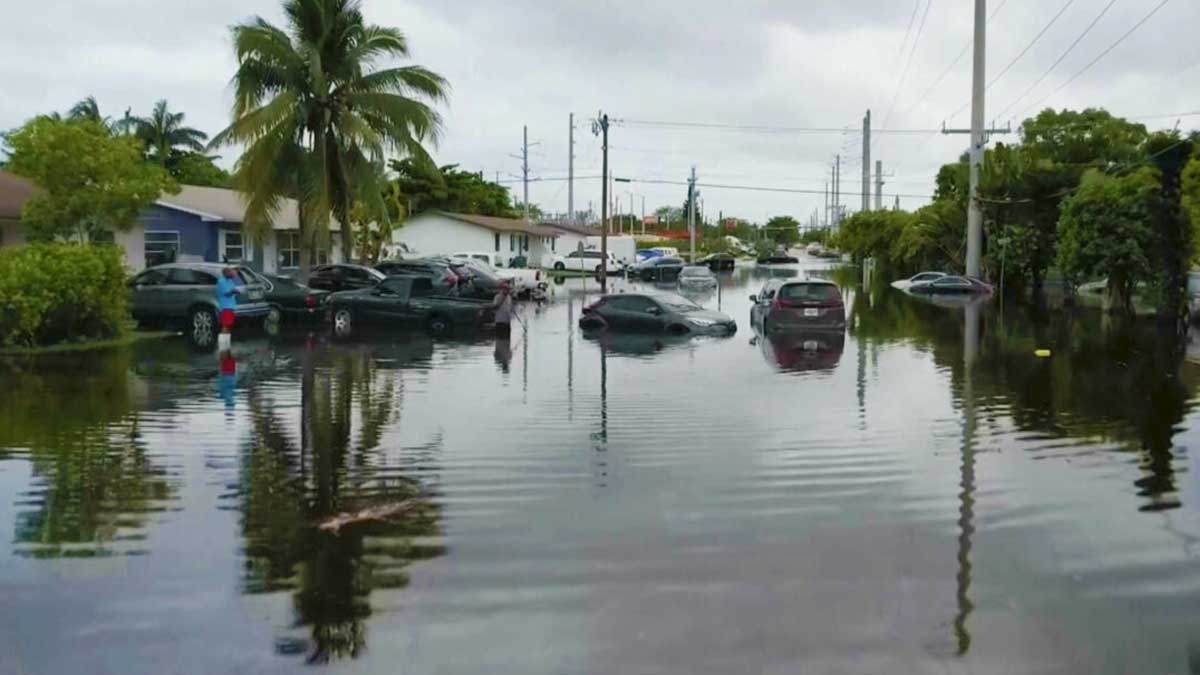- Home
- Billionaires
- Investing Newsletters
- 193CC 1000
- Article Layout 2
- Article Layout 3
- Article Layout 4
- Article Layout 5
- Article Layout 6
- Article Layout 7
- Article Layout 8
- Article Layout 9
- Article Layout 10
- Article Layout 11
- Article Layout 12
- Article Layout 13
- Article Layout 14
- Article Sidebar
- Post Format
- pages
- Archive Layouts
- Post Gallery
- Post Video Background
- Post Review
- Sponsored Post
- Leadership
- Business
- Money
- Small Business
- Innovation
- Shop
Recent Posts
Historic Rainfall Floods Southern Florida

Southern Florida has experienced unprecedented rainfall this week, resulting in significant flooding that is expected to continue into Friday evening. According to the National Weather Service (NWS), the downpour has broken previous records, leading to severe water accumulation in various regions. The NWS forecast, issued on Thursday, indicates that the rain is not over yet, with more showers anticipated. This extreme weather has already caused widespread disruption and damage, prompting immediate and large-scale responses from both state and local authorities.
In response to the deluge, Florida Governor Ron DeSantis declared a state of emergency on Wednesday for several counties, including Broward, Collier, Lee, Miami-Dade, and Sarasota. This declaration aims to facilitate the mobilization of resources and provide necessary aid to the affected areas more efficiently. Governor DeSantis’s emergency declaration underscores the severity of the situation, emphasizing the need for swift action to protect residents and infrastructure. Additionally, the mayor of Miami-Dade County, Daniella Levine Cava, declared a local state of emergency, further highlighting the urgent need for coordinated efforts to manage the crisis and mitigate its impacts.
The NWS has warned that the region should brace for additional rainfall on Thursday afternoon. A flood watch remains in effect for southern Florida until Friday evening, reflecting the ongoing risk of further water accumulation and potential flooding. According to the NWS, the area could receive between four to eight inches of rain, with some locations potentially experiencing more than ten inches. This significant amount of rainfall poses a substantial threat to communities, infrastructure, and daily life, increasing the urgency of emergency measures and community preparedness.
The economic ramifications of this weather event are considerable. A disaster modeler reported to Bloomberg on Thursday that the damages from the storms could potentially exceed $1 billion. This estimate includes the costs associated with property damage, infrastructure repairs, and the broader economic disruption caused by the flooding. The financial impact of such extensive damage highlights the importance of effective disaster response and recovery efforts, as well as the need for long-term strategies to enhance the region’s resilience to extreme weather events.
This week’s rainfall has set new records, illustrating the increasing frequency and intensity of extreme weather events in the region. Southern Florida, typically accustomed to a humid subtropical climate with regular rainy seasons, has found its infrastructure and emergency systems tested by the unprecedented volume of rain. The region’s drainage and flood control systems, designed to handle average seasonal rains, have been overwhelmed by the sheer amount of water, leading to widespread flooding and associated damage.
Communities across southern Florida have been quick to respond to the flooding. Local authorities have established emergency shelters to accommodate residents displaced by the rising waters. Volunteers are working around the clock to provide essential aid and support to affected families, distributing food, water, and other necessities. Local government officials have also advised residents to avoid non-essential travel and stay indoors when possible to ensure their safety and facilitate emergency response efforts.
The environmental impact of this heavy rainfall is significant. Floodwaters often carry pollutants from urban and agricultural areas into local waterways, potentially causing harm to wildlife and ecosystems. The Everglades, a unique and sensitive wetland area in southern Florida, is particularly vulnerable to the effects of extreme weather. Efforts to mitigate environmental damage are ongoing, but the long-term impacts on the region’s ecosystems and natural habitats remain a concern.
Experts have pointed to climate change as a major factor contributing to the increase in extreme weather events like the one currently affecting southern Florida. Warmer global temperatures lead to higher rates of evaporation and, consequently, more precipitation. This week’s rainfall serves as a stark reminder of the broader changes occurring in the planet’s climate system. Addressing these challenges requires both immediate actions to protect communities and long-term strategies to mitigate the effects of climate change.
The current flooding situation underscores the importance of preparedness and resilience in the face of natural disasters. While emergency declarations and immediate response efforts are crucial, building resilient infrastructure and communities is equally important. Investments in flood defenses, sustainable urban planning, and climate adaptation strategies can help reduce the impacts of future extreme weather events. Enhancing community resilience involves not only improving physical infrastructure but also fostering social cohesion and preparedness through education and community engagement.
Government and community organizations are working together to provide relief and recovery assistance. Federal, state, and local agencies are coordinating efforts to allocate funding for repairing damaged infrastructure and supporting affected businesses. Community groups and non-profits are playing a vital role in the recovery process, offering resources and assistance to those in need. The collective response to this disaster highlights the importance of collaboration and shared responsibility in managing and recovering from extreme weather events.
As southern Florida faces ongoing rainfall and the potential for further flooding, the focus remains on protecting lives and property. Residents are urged to stay informed through official channels and adhere to safety guidelines issued by authorities. The collaborative efforts of government agencies, community organizations, and individuals will be crucial in navigating this crisis and rebuilding in its aftermath. The experience of this week’s extreme weather event underscores the need for continued investment in disaster preparedness and resilience to better withstand future challenges.
Recent Posts
Categories
- 193cc Digital Assets2
- 5G1
- Aerospace & Defense46
- AI37
- Arts3
- Banking & Insurance11
- Big Data3
- Billionaires449
- Boats & Planes1
- Business328
- Careers13
- Cars & Bikes76
- CEO Network1
- CFO Network17
- CHRO Network1
- CIO Network1
- Cloud10
- CMO Network18
- Commercial Real Estate7
- Consultant1
- Consumer Tech180
- CxO1
- Cybersecurity68
- Dining1
- Diversity, Equity & Inclusion4
- Education7
- Energy8
- Enterprise Tech29
- Events11
- Fintech1
- Food & Drink2
- Franchises1
- Freelance1
- Future Of Work2
- Games141
- GIG1
- Healthcare78
- Hollywood & Entertainment186
- Houses1
- Innovation42
- Investing2
- Investing Newsletters4
- Leadership65
- Lifestyle11
- Manufacturing1
- Markets20
- Media193
- Mobile phone1
- Money13
- Personal Finance2
- Policy567
- Real Estate1
- Research6
- Retail1
- Retirement1
- Small Business1
- SportsMoney33
- Style & Beauty1
- Success Income1
- Taxes2
- Travel10
- Uncategorized8
- Vices1
- Watches & Jewelry2
- world's billionaires418
Related Articles
Netflix Secures 2027 and 2031 Women’s World Cup Rights
Netflix has clinched an exclusive streaming deal for the next two FIFA...
By 193cc Agency CouncilDecember 20, 2024Meta Fixes Facebook, Instagram, WhatsApp Outages
Meta, the parent company of Facebook, Instagram, and WhatsApp, faced significant outages...
By 193cc Agency CouncilDecember 12, 2024Roy Jones Jr. Confident He Can Beat Jake Paul, Issues Challenge
Boxing legend Roy Jones Jr. has made waves by declaring that he’s...
By 193cc Agency CouncilDecember 11, 2024Tsunami Warning Lifted After 7.0 Quake Off California Coast
A tsunami warning that affected large portions of northern California and Oregon,...
By 193cc Agency CouncilDecember 6, 2024















Leave a comment